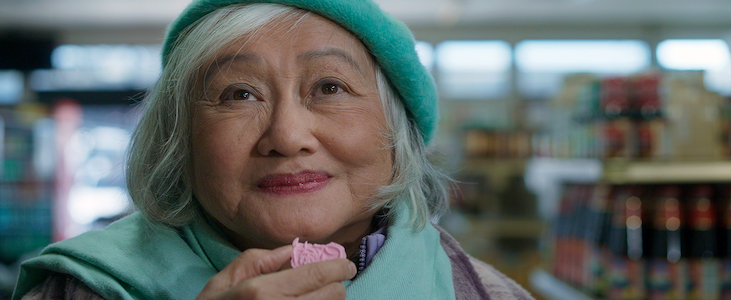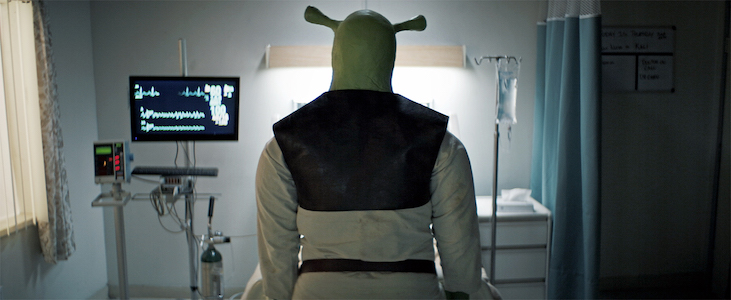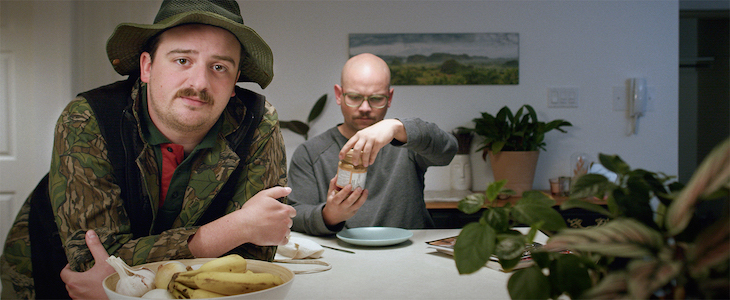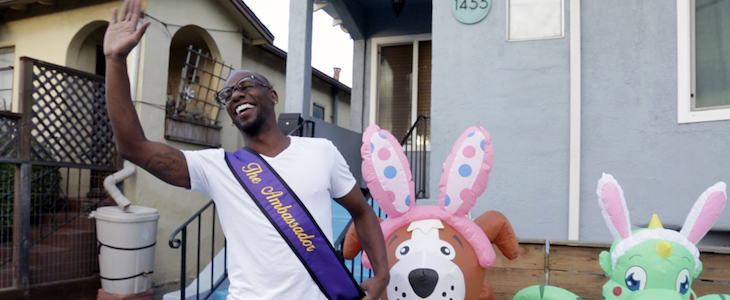Film Reviews: Shorts at the 2023 Independent Film Festival Boston — Some Tasty Morsels
By Betsy Sherman
A rundown of three narrative programs and one documentary program. We just might see these directors’ names on future IFFBoston features.
The 20th annual Independent Film Festival Boston Short Film programs – through May 2. All screen at the Somerville Theatre, see below for dates and times.
In its 20th year, the Independent Film Festival Boston continues its dedication to showcasing short films as well as fiction and documentary features. The names of its eight programs — four narrative and four documentary — pay tribute to the eight alphabetical parallel streets in the Back Bay, Arlington through Hereford.
As always there are tasty morsels to sample in these collections. We just might see these directors’ names on future IFFBoston features. Below is a rundown of three narrative programs and one documentary program.
Shorts Arlington: Narrative (showing Friday 4/28 at 6:15 p.m. and Sunday 4/30 at 12:30 p.m.) offers a very enjoyable quartet of shorts about romantic pursuits, successful and unsuccessful (all by women directors).
For Bolognese, Annika Ellwanger-Chavez co-directs with Sara Linden and plays the female lead, Mira. Mira and Aiden are on their first in-person date, after having gotten to know each other in the precarious and often delusional online realm. The date is at his place, where he is planning to show off his cooking skills with the eponymous pasta dish. A pre-meal frolic, however, shows that Aiden has, um, baggage. Throughout his comically portrayed revelations, Mira is a trouper; she keeps her dignity intact and lives to date another day. This well-paced and well-acted story underlines the importance of fortitude —and of getting a doggie-bag.

A scene from Annika Ellwanger-Chavez gob-smacking Helium.
Ellwanger-Chavez is back behind the camera with the lively, gob-smacking Helium. She co-wrote with Sophie Thomason, who’s one of the cast of four. Two women friends host a double-date (one dates a man, the other dates a woman). As the night ticks down and the inebriation level ticks up, there’s an argument between the guests, and not entirely satisfying sex. Through it all, two friends send each other signals of support, not only in real time, but also in cut-aways set in a balloon-filled alternate plane where they put on wigs and exaggerated, clown-style makeup. This one reminded me a bit of the surreal Daisies, or maybe a glimpse at an older version of the girls in Booksmart.
In Kiss ‘n’ Ride, animator Olivia Jensen perfectly conveys the bliss felt by its protagonist, a beret-wearing young woman buoyed by what she experiences during a café date with another young woman. The wordless piece features pulsating line drawings on a white background, providing a seamless style for transitions from the real world (going to an ATM, taking a commuter train) to the boundless romantic imaginings of the heroine. Absolutely lovely.

A scene from the musical comic drama Supermarket Affairs.
A Texas mini-mall is the site of an Asian supermarket fantasia in Hang Luong Nguyen’s musical comic drama Supermarket Affairs. Generation gap meets cultural gap for Mrs. Hoa and her Americanized grown daughter Ha; the latter sponsored her mother’s immigration from Vietnam to the U.S. after her father died of lung cancer. There’s some friction in the relationship. Mrs. Hoa, who doesn’t speak English, makes a trip to the Asian market to gather materials for an offering for her late husband. Something clicks when she sees a handsome younger man who works there, and it triggers a colorful musical fantasy sequence set to the Vietnamese song “Supermarket Love Affair.” Nguyen Thi Minh Ngoc stands out as the indomitable Mrs. Hoa.
The Shorts Berkeley: Narrative program (Thursday, April 27 at 6:30 p.m. and Sunday, April 30 at 6 p.m.) is another good bunch, featuring wry comedies, some on the darker side.
It’d be a shame to give away the punchline of McKegg Collins’s Best Buddies. Let’s just say friends and colleagues Sadie and Tom pursue a transgressive line of work that’s not conducive to settling down. Sadie busts Tom’s chops about his succession of girlfriends in search of that “white picket fence bullshit.” There’s action as well as talk in this sardonically funny short.

A scene from Matt Kazman’s Donkey.
Matt Kazman’s Donkey spotlights sympathetic loser Russell, a Shrek birthday-party entertainer. Rejected by a birthday child’s mother for not being convincing enough, he retreats to his car and a much-needed Power of Positive Thinking recording. A family crisis detours him to the hospital, where he pours his heart out—still in full Shrek makeup—to the unconscious patient. With a nice touch of absurdity, Russell gets some validation that his life is not completely on the wrong track.
Noises, by Eric Schuman, uses visual and sonic distortion for a feverish take on apartment living. The protagonist has to cope with demanding neighbors and a mysterious noise that might be caused by stealthy intruders from the animal kingdom—or by something more alarming.

A scene from Maxime Divier’s rollicking Peanut Butter.
The rollicking comic saga Peanut Butter, from Quebecois director Maxime Divier, has a narrator (sometimes off-screen, sometimes on) who guides us through the curious case of Dan (Cédrick Mainville), seen in a supermarket trying to choose the nut butter with which he’ll off himself. He’s allergic to nuts, you see. And he’s in crisis, having just lost his job, his apartment, and his girlfriend. “He’s gonna be a legend” as the first person to commit suicide by peanut butter, says the narrator. Dan works on the staging, choosing a significant place and ritualistic objects with which to surround himself with. But first he joins an athletic club to get himself in shape for the big moment. Could a healthy lifestyle thwart Dan’s suicidal dreams?
The trenchant Run Amok, by Nitzan Mager, uses humor to critique the reaction of thoughts ‘n’ prayers and the same old songs in the aftermath of school shootings. Schoolgirl Meg (Alyssa Emily Marvin), a harpist, has ideas that would disrupt that norm. She proposes to the principal and a teacher her own musical commemoration of a mass shooting that took the life of someone dear to her. It’s the contrast between Meg’s composure and the adults’ spinelessness that makes the film work.
John Killoran’s School Nights is a sweet ode to an ‘80s childhood, as one night, a man visiting his hometown crashes his car and steps into a time-warp school dance. His seventh-grade friends are played by adults in ‘80s kid clothing, bopping to the pop hits of the day. All hail Member’s Only jackets and Drakkar Noir.

A scene from Jarreau Carrillo’s The Vacation.
Jarreau Carrillo’s The Vacation gradually pulls you into the world of its protagonist, even though it only takes place in his stationary car. Aaron really wants a day away from the shop to relax at the beach. But his car won’t start. Three friends join him in the car (Carrillo plays one); they smoke weed, talk about their current situations and, goaded by Trae, who’s read The Secret, share visions for their future. There’s some great mutual needling here. I wanted more—make this into a feature film! Even if the car never goes anywhere.
The Shorts Clarendon: Narrative program [Friday, April 28 at 9 p.m. and Saturday, April 29 at 4:15 p.m.) shifts gears towards the dramatic and/or suspenseful. More good choices.
Bryan Poyser’s Don’t You Go Nowhere begins amidst the good vibes of a jazz club. The drummer announces veteran singer Doc Marvell (the sensational Mac Mcintosh), who launches into a blues number. When Doc invites audience participation, he gets a good number of off-key contributions. Then he finds a young woman (Taméca Jones) who really has the pipes; he invites her up on stage. The consequences of his choice generate some emotional turmoil. There’s a beautiful depth of feeling in the drama, and it’s conveyed with warmth.
As in the aforementioned Donkey, Catherine Licata’s The Invite features a protagonist who needs a boost from a motivational recording. Josefina (Carolina Vargas), an immigrant, has her mind set on success. She has a cleaning job where the woman of the (fancy) house is a bit jittery, wanting everything to be just right for the party that evening. Using her new arsenal of wisdom, and an anecdote from her life experiences, Josefina gently offers the hostess some advice. But the moment of bonding doesn’t prevent a miscommunication between the women, reflecting the entrenched class system. This is another well-acted, well-staged entry.

A scene from Kyle Taubken’s Nordo.
Nordo, by Kyle Taubken, unfolds in August of 2021. Lauren’s husband Sean has volunteered to fly people out of Afghanistan for the U.S. military because our country’s involvement there ended. The ease of worldwide communication in the digital age becomes a double-edged sword. The screen itself becomes a source of anxiety, showing text messages from Lauren to Sean (and an emptiness where his answers should be), messages from worried friends and family, and news alerts about the calamity in Kabul. The film also makes effective use of sound montage.
October Mourning, by Frederick Thornton, catches an African-American family with grown children at a solemn moment: the funeral reception after the death of the father. The son, Henry (Jermel Nakia), feels badly shaken, so he retreats to the bedroom of his youth. His father (Rif Hutton) appears to him, presenting a chance for each to say what has long gone unsaid. From here on, it’s a straight-ahead drama, well-acted and well-written, encompassing some venting, a little joking, a bringing to light of family history, and a genuine expression of emotion.

A scene from Christine Delp’’s Pickup.
Christine Delp’s Pickup gets under the viewer’s skin with its thriller treatment of a pre-dawn rideshare trip to the airport. It’s a space where behavior expectations are not exactly clear-cut. Is the businesswoman’s distractedness tolerable or rude? Is the male driver’s chattiness welcome or annoying? A fraught interaction becomes scary, and the all-powerful star rating system looms large. The driver’s pleading for five stars is squirm-inducing. Will he get his way?
After its adorable opening, Japanese short The Special Seat by Akira Okumura takes a fantastical swerve. Ami has an online audience for her ASMR videos that deliver to viewer/listeners the intimate, close-to-your-ear sounds of her munching on candy and pastries. While editing her latest creation, she’s freaked out by a voice and a presence in the room. I’ll say that I don’t want to give away the ending—but I don’t think I’d quite know how to describe it even if I wanted to. Still, it’s kind of a fun one.
Crossing over to the documentary side, the Shorts Fairfield: Documentary program (Thursday, April 27 at 8:30 p.m. and Tuesday, May 2 at 9:30 p.m.) is a mixed bag.
Bare Metal , directed by Brandon Gries, Ryan Freng and John Shoemaker, is about an issue that may be, or should be, known to the type of person that goes to a film festival—the enormous amount of energy demanded by data centers (housing servers), most of them dependent on fossil fuels. The film suggests how greener energy can be used, and advocates partnerships among industries to accomplish this. All that good stuff said, it’s not the best choice for film festival programming. A festival film, to me, has to have a human touch or and/or inventiveness in its form or technique. Bare Metal is a bombardment of information spoken by talking heads, with visuals of industrial activity and construction, leading to some shots of nature towards the end.

A scene from Mimi Chakarova and Lola Noguer’s The Block.
The Block is a collaboration between documentarian Mimi Chakarova, known for her films about human rights, and artist Lola Noguer. In a way, it’s two good films grafted together, which might have been better had there been some integration between the sections. The title refers to the longest block in the once Black neighborhood of The Flats in Berkeley, California. Housing prices have skyrocketed, and the racial/class mix has changed. The bulk of the film is animated and scripted, as a long-time resident, a Black woman, tells an interviewer about the old-timers and newcomers, and about the insult and injustice of redlining. Noguer’s gorgeous artwork makes the people and pets of the neighborhood come alive. In the latter part of the film, they really do come alive in live-action sequences in which they can speak for themselves. In spite of the serious issues at hand, a bright spirit shines through.
With Dollar Pizza Documentary, directors Alex Mallis and Travis Wood celebrate New York City’s consumers and purveyors of the dollar slice of pizza (which even at the time of filming had gone up to at least $1.50). This foodstuff “defines New York.” Most of what’s on screen here is routine, with a bit of pizza-centric philosophizing thrown in. Too bad Joey Ramone isn’t around anymore; he could have made a great cameo.
Danny Mortimer’s Feeding a City: Boston’s Fight Against Food Insecurity is exactly what you’d hope for in a Boston film festival. With robust footage and pithy interviews with the people at the heart of the issue, it fills us in on a topic we might know just sketchily: how food insecurity has been addressed in the area, especially amidst the shutdowns of the pandemic. We see the nerve center for collecting and distributing food, the Huntington YMCA, and hear from the folks at the Greater Boston Food Bank, City Hall’s Office of Food Justice, Project Bread, and many food suppliers, including farms. We witness action on several fronts, involving multiple ethnic and religious communities. Crucially, we hear how the problem is far more than just a matter of creating pipelines that will bring nutritious food to the people that need it. Large-scale systemic changes are needed. At Project Bread, they assert, “There is enough food, so we don’t look at this as a food problem, we look at this as an economic problem.”

A scene from Hannah Gearan’s Toxic Faucets: Five Decades in Durham, CT.
Ditto for Toxic Faucets: Five Decades in Durham, CT, an important piece of reportage by director Hannah Gearan. We’ve heard about Flint, Michigan, and Jackson, Mississippi; far less national attention has been paid to the water crisis in this rural New England town. Companies dumped chemical solvents in Allyn Brook—which runs behind a middle school—during the ‘50s and ‘60s. Residents have suffered from the aftereffects. An interviewee with breast cancer believes her health was damaged by her exposure to the toxins as a child. The area was made an EPA Superfund site many years ago, but it remains a “toxic soup.” Nearby Middletown has stepped in to help, but the film maintains that there’s no easy happy ending.
Betsy Sherman has written about movies, old and new, for the Boston Globe, Boston Phoenix, and Improper Bostonian, among others. She holds a degree in archives management from Simmons Graduate School of Library and Information Science. When she grows up, she wants to be Barbara Stanwyck.

